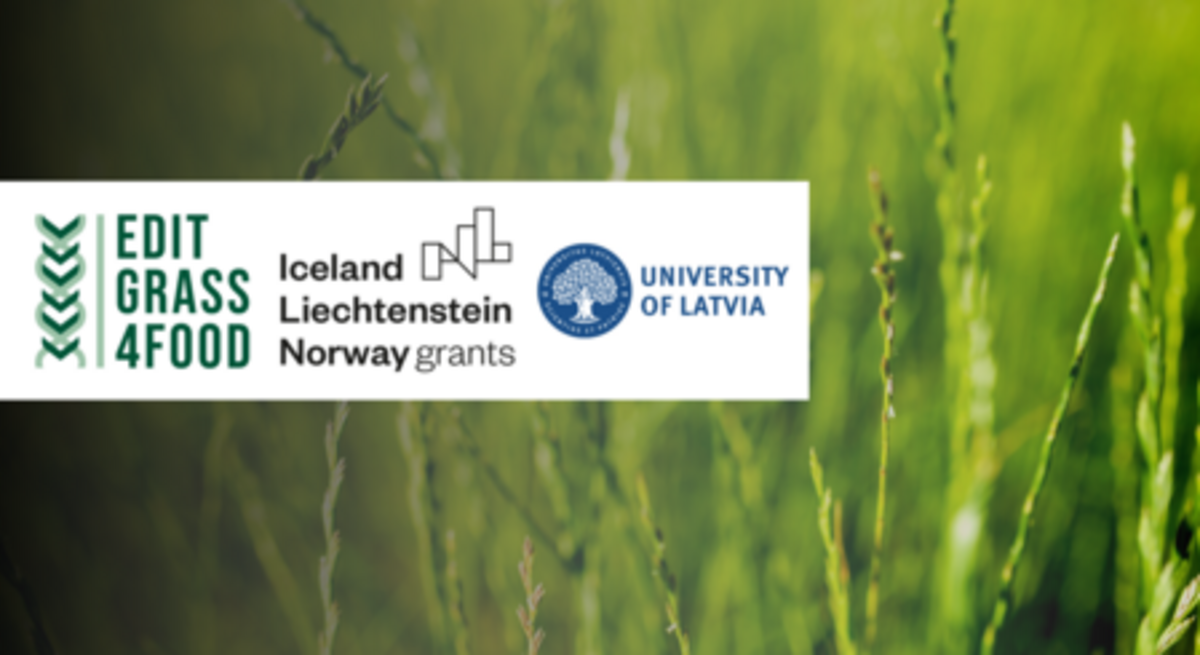Detail view

Project partner meeting at University of Latvia, March 2023
The Faculty of Biology of the University of Latvia (UL) in cooperation with partner organizations Norwegian University of Life Sciences, Lithuanian Research Center for Agriculture and Forestry and Tallinn University of Technology organizes the final conference of the project "Improving adaptability and resilience of perennial ryegrass for safe and sustainable food systems through CRISPR-Cas9 technology – EditGrass4Food”, co-financed by the European Economic area and Norway Grants, on April 5, which will take place at the UL Nature house, Jelgavas Street 1, Riga. The conference will present the three-year cooperation and the achievements of research results dedicated to the abiotic stress resistance of perennial ryegrass and its improvement.
Today, increasingly unpredictable climatic conditions cause difficulties for perennial grasses, such as perennial ryegrass (Lolium perenne L.), which are essential for pastures and meadows. Climate change is one of the factors that can have a negative impact on agriculture and food security. The European Green deal and farm to Fork (F2F) Strategy envisage that biotechnology will play an important role in ensuring food security and help ensure the sustainable development of the EU economy. Grasslands plays a key role in both the production of animal feed and human population recreation. Perennial ryegrass is an important plant species in meadows and pastures, but it often lacks the resilience to climatic conditions in northern Europe and the Baltics, which are becoming increasingly unpredictable due to climate change.
The last winter season of 2023-2024 also showed that the usual blanket of snow could completely disappear, the soil could thaw, but it could be followed by bare frost. Such conditions have a significant impact on perennial grassland and reduce its productivity. The EditGrass4Food project brings together leading scientists from the Baltic States and Norway to develop solutions to the complex problem of abiotic stress as a result of climate change, using the important forage grass species perennial ryegrass as a model.
The results of the project will have an impact on the productivity of pastures and meadows in the Baltic States and Norway, as well as a wider impact on the resilience of different agricultural crops under climate change. The main goal of the project was to characterize the abiotic stress tolerance of genotypes of perennial ryegrass, to assess their genetic basis by studying changes in gene expression, as well as to make changes in abiotic stress tolerance by editing key genes involved using the CRISPR/Cas9 system.
The project involves partners from the Baltic States and Norway who had not co-operated extensively until now. Intensive communication between partners made it possible to match expectations with opportunities and set feasible project objectives. The COVID-19 pandemic limited the possibility for project partners to meet face-to-face, while Russia's invasion of Ukraine created additional stress and increased project costs. At the same time, these challenges created additional opportunities in the area of communication. It should be noted that the Baltic Research Programme provides an opportunity to financially support Ukrainian scientists, which enabled the project to involve a specialist with significant experience in plant genetic transformation.
The final conference of the project will provide an opportunity for participants to discuss the results obtained and the follow-up actions to ensure the sustainable impact of the project and to inform about the achievements and future objectives of the project to the general public.
Programme of the event
09:00 Dr. Līga Ozoliņa-Moll (Dean, LU Faculty of Biology), opening words
09:15 Dr. Odd Arne Rognli “Surviving drought, frost, and ice – how to breed resilient perennial grass cultivars?”
09:50 Dr. Nils Rostoks “Improving abiotic stress tolerance in perennial ryegrass using genome editing - EditGrass4Food project”
10:10 Dr. Cecilia Sarmiento "The regulation of New Genomic Techniques in the EU"
10:30 Coffee break
11:00 Dr. Kristina Jaškūnė “Abiotic stress response in ryegrasses: old problems and new opportunities”
11:20 Dr. Mallikarjuna Rao Kovi “Transcriptome profiling reveals insight into the cold response of perennial ryegrass”
11:40 MSc Ferenz Sustek Sánchez “Genome editing in perennial ryegrass protoplasts”
12:00 Dr. Anete Borodušķe “Genetic transformation of perennial ryegrass using ectopic expression of morphogenic regulators”
12:20 Closing words and outlook
12:30 Lunch and coffee
13:30 End of conference
About the project
The aim of the project is to improve the adaptability of perennial ryegrass to frost and drought stress conditions, taking into account ongoing climate change. In the course of the research, it is planned to find out which perennial ryegrass genes are responsible for the plant's resistance to abiotic stress. Next, it is planned to use modern genome editing methods, the discovery of which in 2020 was awarded the Nobel Prize in Chemistry for acting on specific genes and altering their function. Thus, the abiotic stress tolerance of perennial ryegrass is expected to be altered. The implementation of the project started on May 1, 2021 and will last until April 2024. The total funding of the project is 1,000,000 euros.
About grants
The European Economic Area (EEA) and Norway grants are financial support provided by Iceland, Liechtenstein and Norway (donor countries) based on the agreement signed on July 28, 2010 between the donor countries and the European Union on the allocation of funding for the implementation of grants in the new 2014-2021 project period.

 Academic Centre
Academic Centre